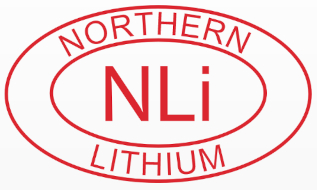Northern Lithium Ltd today announces the launch of its inaugural lithium development project in the North East of England, having recently secured the rights and entered into definitive mineral rights agreements to explore for, and extract, lithium and other minerals contained in underground hot saline brines, already known to exist within the Weardale Granite of County Durham.
Previous studies of the groundwater within the Weardale Granite have identified that lithium is present at sufficiently high concentration to consider the potential for commercial production. Locally sourced lithium, as a raw material product, in the manufacture of lithiumion batteries, will be essential to meet the supply chain requirements of the rapidly growing market for electric vehicles and for power storage in the UK and Europe.
With major economies like the US, China and the EU joining the UK in committing to reach net zero by 2050, the demand for batteries and battery storage is set to soar. A secure and sustainable domestic supply of lithium will support the production of batteries with a lower carbon footprint, boost the local economy and provide a much-needed incentive for battery manufacturers to build factories here in the UK.
If successful, the project could ultimately establish the North East of England as a new centre of lithium production and provide a further economic boost to the region following the recently announced plans to expand lithium-ion battery manufacturing in the North East.
The rights secured by Northern Lithium, are the result of a three-year discussion and negotiation process with a minerals rights owner. Northern Lithium will now begin its exploration programme, initially through a data-based exercise to identify target areas along the historically mined Slitt and Red Veins, with physical exploration and commercial extraction only commencing once extensive local consultation, design, statutory planning and environmental consent steps have been completed.
In recent years, a number of other companies in Cornwall, the USA, France and Germany have sought to exploit lithium and other mineral extraction from similar saline fluids and progress in this area has been helped by the development of new mechanical filtration technology, helping reduce the costs and environmental footprint of lithium production when compared to the outputs from traditional sources like Chilean and Argentinean salars. In terms of the local area itself, each Weardale production site will likely comprise extraction and reinjection wells with a lithium production facility built between them. Part of the next evaluation and design phase of the project will determine the suitability of different production plants but various small-scale off-the-shelf options that fit into a container are available. To further minimise environmental impact, the extraction process itself will be designed to be as closed loop as possible, with the residue waters re-injected back into the groundwater after lithium has been extracted.
Nick Pople, Managing Director of Northern Lithium, commented: “Establishing a homegrown supply of lithium here in County Durham will be essential to accelerate the transition to electric vehicles, achieve the UK Government’s ten-point plan and make significant progress in reaching our net zero commitments by 2050. We’re delighted to launch this project so that exploration can get underway. If successful, not only will it reactivate mining and minerals extraction in the local area, the North East has the potential to become a core centre of lithium-ion battery and electric vehicle manufacturing using locally sourced raw materials, bringing jobs and economic growth to the region.”
Roger Bade, Technical Director of Northern Lithium, said: “I am excited to be part of Northern Lithium and this specific project, having extensively studied the Northern Pennine Orefield and associated mining and mineral extraction opportunities for over 40 years, since I was a mining student at the Royal School of Mines, Imperial College in 1981. If successful with this particular lithium project, we have the opportunity of writing a new chapter in the 1,000 year history of mineral extraction in the region whilst introducing modern sustainable extraction methods to maximise efficiency of lithium extraction from the saline brines, ensure low footprint areas for extraction and minimise environmental impact to the local area.”

